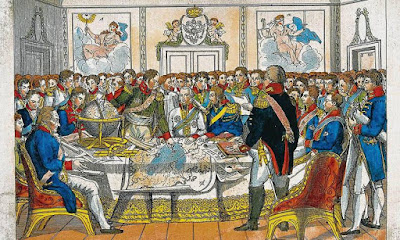 |
| Signing the Final Act in 1815 |
In the run-up to the Vienna conference, the Freiburgers did everything to stem the tide. A delegation of Freiburg's city council visited the Austrian Emperor Franz when he paused in Basel on his way back from Paris to Vienna in June 1814. They subserviently begged "Him" to reunite the city and its surroundings with the Austrian Empire. In an audience, the emperor fed the men with hopes of restoration, although a decision would still take a couple of months. In the meantime, the Breisgauers should remain calm and obedient, refraining from public demonstrations.
Despite those warnings, the city council had a medal struck showing on one side the Minster church and bearing the following inscription: In remembrance of the reunification of the Breisgau with Austria, Freyburg 1814. Following the warning of the emperor about a possible delay, the year was later changed to 1815.
The other side of the medal shows a bust of Franz I on a pedestal with his people hailing him: To Franz I in loyalty and love. On the pedestal, you can barely read: Our wishes are fulfilled. This medal issued by the city, supposed to be loyal to the House of Baden, is known in Freiburg's history as the Hochverratsmedaille (high treason medal).
Eventually, the decision-makers at the Congress of Vienna put the final nail into the Freiburg coffin. Austria abandoned the far-away Breisgau for the nearby Salzburg territories. This also meant that Austrian Chancellor Klemenz von Metternich cleverly left the watch against the "arch-enemy" France on the Upper Rhine to the Prussians, happy to acquire new territories on the Lower Rhine. In fact, the carefully adjusted balance of power on the continent achieved in Vienna lasted 51 years until 1866, the year of the fraternal war between Austria and Prussia.
*


No comments:
Post a Comment